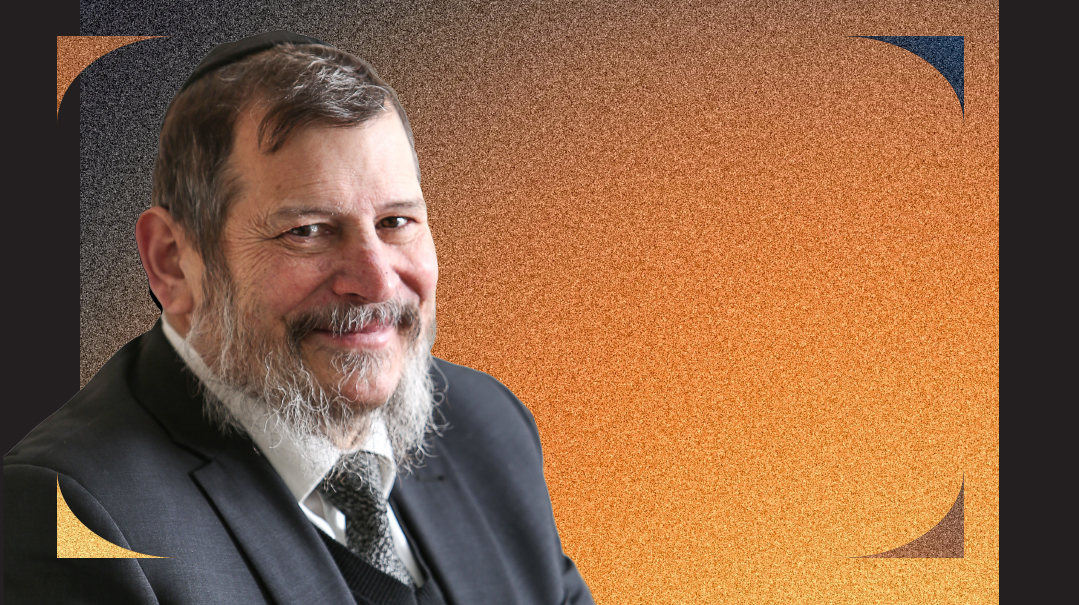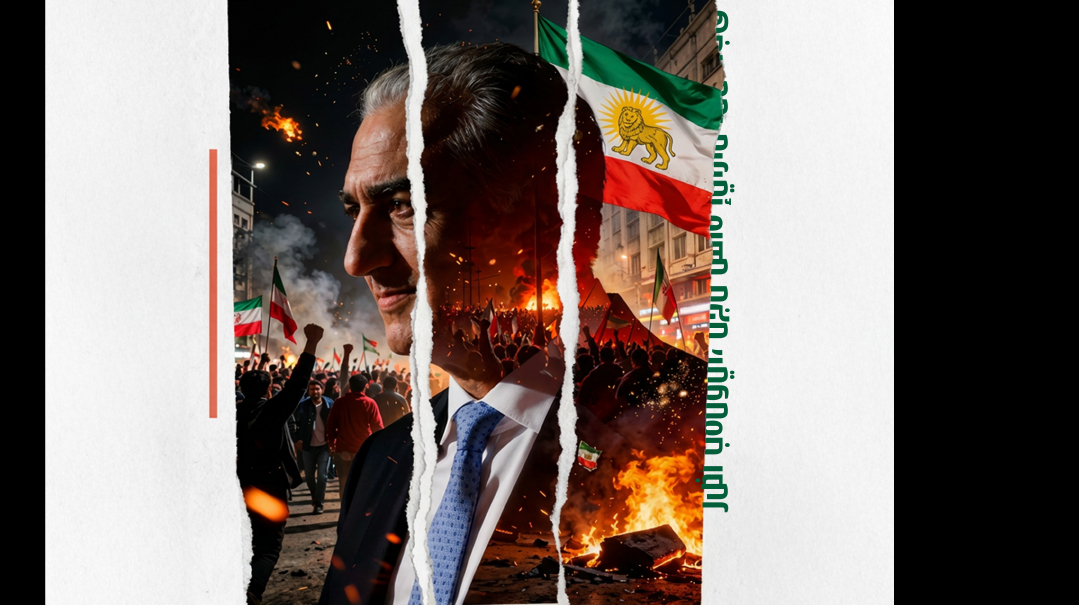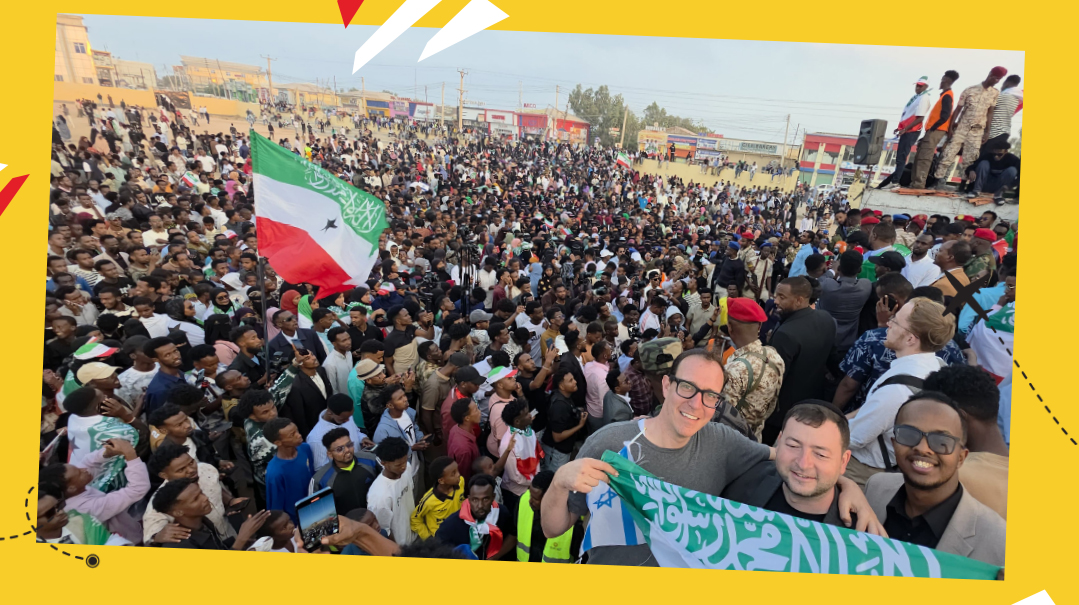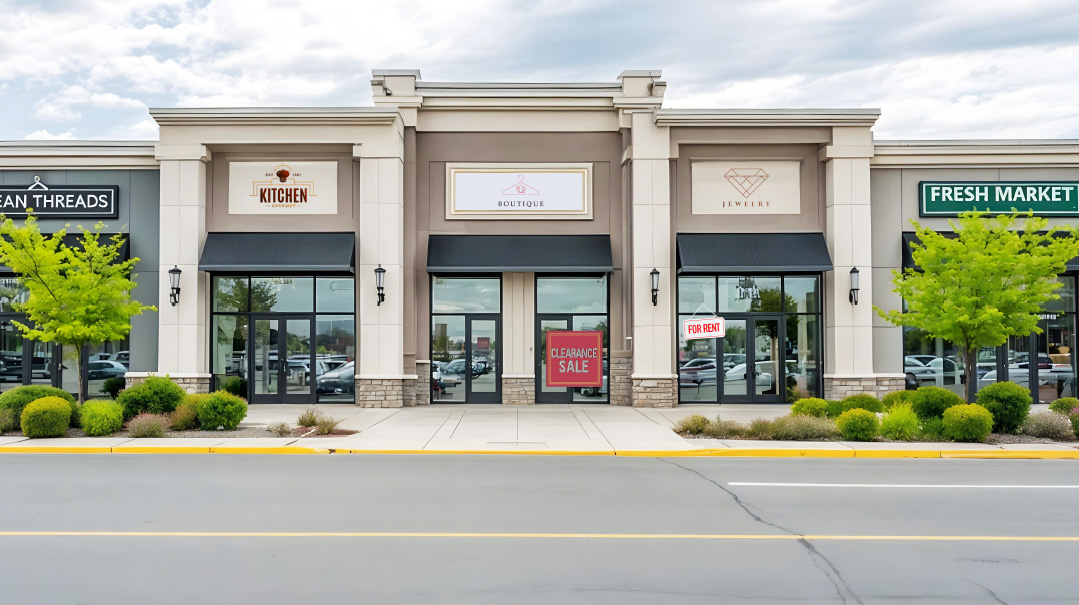Diplomatic Note

Malcolm Hoenlein writes the rulebook for diplomatic success, and wants Orthodox Jews to step up
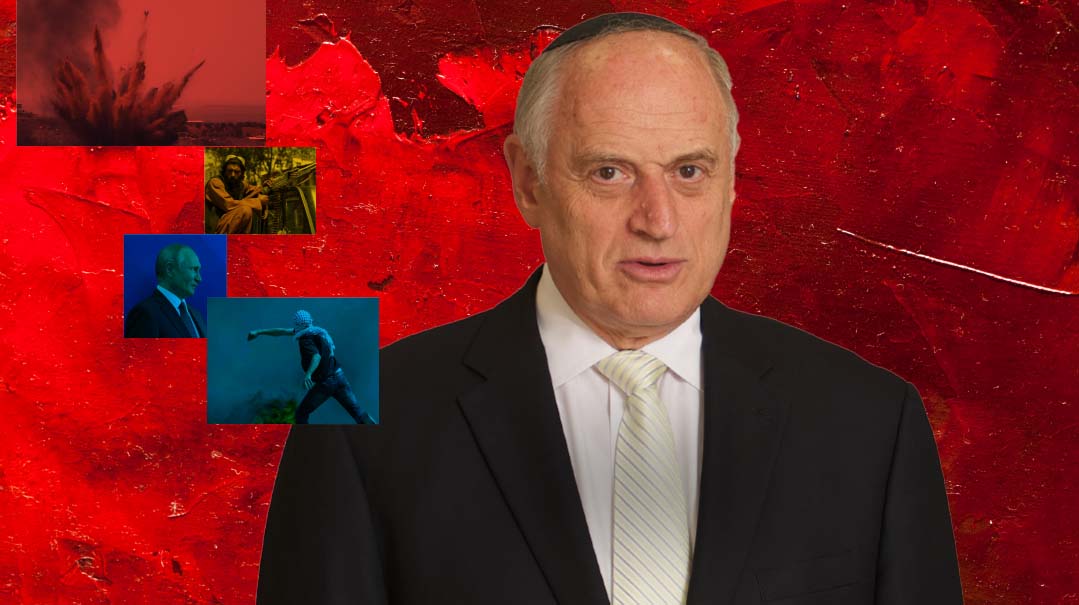
Photos: Meir Haltovsky, Flash90
Malcolm Hoenlein is no alarmist, but he’s sounding the alarm.
The man who’s had the ear of democrats and despots across the world for what seems like forever, is deeply worried by the last year. Hyperbole isn’t his style; interests are more compelling when it comes to calculations of power. But now, as a child of Holocaust survivors, he reaches for some dark imagery. “It’s not Germany 1938,” he says, “but it feels like 1935.”
The reason is an unprecedented convergence of threats to the Jewish world. Even after the historic peace deals with Gulf States justified Hoenlein’s long-held hopes, the Iranian threat is turning critical. And for the first time, anti-Semitism is not just a European problem. While threats to milah and shechitah are ever-present in the Old World, the mainstreaming of far-left anti-Israel hostility as embodied by the Squad and the spillover of Gaza tension onto New York’s streets are new to American shores.
In a conversation that’s part stream-of-consciousness, part tour d’horizon after a year of diplomatic breakthroughs, he returns more than expected to the home front.
“No one anticipated that in 2021 America, we’d have to worry about the security of our shuls. We used to deal with country-club anti-Semitism, but now religious-looking Jews are being attacked for what’s happening in Gaza.”
Hoenlein’s concern takes in the future of community leadership as well. After decades at the helm of the Presidents’ Conference — perhaps the most influential Jewish diplomatic post outside of Israel — he’s stepped back from the day-to-day to focus on larger projects for the organization. But although religious Jews are politically active more than ever, the numbers following in his own footsteps to head major nondenominational organizations has fallen.
Fifty-five years after he took up advocacy for the Jewish People, Malcolm Hoenlein has his eye on the next generation of leaders, and he’s sharing his hard-earned wisdom.
“You have to be able to keep a secret,” he says of his decades-worth of conversations with world leaders. That’s why Hoenlein gives very little away despite his torrent of analysis, anecdotes, and sometimes-passionate statements.
“Leaders,” says this unusual mix of accessibility and shadow man, “value trust.”
When the world looked on astounded as Israel and the Gulf States signed peace agreements at the White House last year in a breakthrough that seemed to have sprouted from the desert sands, Malcolm Hoenlein was able to take the long view.
“It was a pleasant surprise when the deals were announced,” he admits, “but having started visiting the Gulf 25 years ago, I always believed that there were great opportunities for Israel. I saw the slow erosion of hostility at the official level, as leaders realized that with America withdrawing from the Middle East and with an aggressive Turkey and Iran, plus China and Russia active in the region, Israel was actually a source of stability.”
Israel’s former Washington ambassador Ron Dermer, who negotiated the Abraham Accords, used more colorful phraseology to make the same point about the change in Israel’s standing. “If you think about it from the Arab states’ point of view,” he told me last year in an exit interview, “what you see is an Iranian tiger or an ISIS leopard and you have an 800-pound American gorilla that is leaving the building, and they look around and see a 250-pound gorilla with a kippah on, and they say, we’d like to have a strong partnership with you.”
That change in Israel’s standing was long in the future and the collection of sheikhdoms that form the United Arab Emirates was still known as the Trucial States — a British protectorate — when Malcolm Hoenlein got his first taste of Middle East action.
“I graduated young from college, having read Middle Eastern studies and international relations,” he recalls, “and in 1966 I came to visit Jordan. It was a year before the Kotel was liberated, but I got to visit. I was then arrested by the Jordanian Legion, which is a long story. They accused me of being a CIA spy because I witnessed them breaking the armistice agreement that governed the resupply of the Mount Scopus enclave. I later received an apology from the Jordanian king.”
Putting that less-than-auspicious start behind him, Hoenlein went on to become a familiar face in Middle East capitals, picking up a decoration from the king of Morocco and paving the way for then-Israeli foreign minister Shimon Peres to visit the Gulf in the ’90s.
His cardinal rule of Middle Eastern shtadlanus might be summed up as: It’s not just who you know, but what you know as well. That maxim is on display in every conversation. Ferociously well-briefed, Malcolm Hoenlein switches effortlessly between discussing Iranian expansionism, Jew-hatred on US campuses, Turkey’s neo-Ottoman ambitions, and graves in Eastern Europe.
Shortly before Bashar Assad’s country plunged into a decade-long bloodletting in 2011, Hoenlein sat opposite the dictator at his palace in Damascus. Syria’s leader — a London-trained ophthalmologist with a British wife — was still seen by some in the West as a moderate, and Hoenlein wanted to press him about a subject of concern for both.
A rampant Iran was pushing for nuclear weapons to threaten Israel, while spreading unchecked across the Middle East in a bid to form a Shi’ite crescent from Lebanon to Yemen. In Tehran’s expanding presence immediately to Israel’s north, the veteran diplomat spotted an opportunity to drive a wedge between Iran and Assad.
“Arab leaders test your knowledge when you first meet them, to assess what you’re worth, what you know” says Hoenlein. “So after about an hour of discussion, I said, ‘Mr. Assad, you have to be careful about the Iranian-funded mosques in Syria — they’re being used to expand Iran’s influence.’ ”
Surprised by his guest’s detailed knowledge, Assad turned to him quickly and demanded, “How do you know about them?” Hoenlein added that according to his information, there were 29 such mosques in the country. Assad’s response was, “ ‘You’re right, and that’s why I recently ordered 28 of them to close.’ ”
The slow fading of anti-Israel hostility that he witnessed across the region convinced Hoenlein that a breakthrough was possible. “Of course, there is still public animosity to Israel, and in these countries, governments can change overnight. Yet if you ask people there, the Palestinian issue is not even in their top 30 priorities. Leaders in Arab countries tell me, ‘We invested billions in the Palestinians, yet they pocketed it all.’ ”
Despite Israel’s rise in the collective Arab estimation, says Hoenlein, the dramatic scenes of peace on the White House lawn wouldn’t have been possible without American heft. For Sudan and even Morocco, concessions from the Trump administration were important as a way to sell the deals to their populations. But once under way, the deals have untold potential.
“We’ve only scratched the surface of what’s possible with the Arab world,” says Hoenlein. “Leaders there tell me how much they want Israeli tech, and the Biden administration wants the peace deals to grow to Oman, and eventually Saudi Arabia. The potential for deeper cooperation with Central Asian Muslim countries like Azerbaijan is great.”
“For the last decade, I’ve been pushing hard a Mediterranean grouping of moderate countries, uniting Cyprus, Greece, and Israel. Now many other countries want to be in it because we can create a stable basin in the Mediterranean from the Gulf to the Atlantic.”
It’s an open question whether Israeli tech or Iranian expansionism was the main catalyst for the breakthrough to the Gulf, but the Iranian file has occupied a lot of Hoenlein’s bandwidth over the years. It took him to Assad’s palace, and to a meeting with the Japanese prime minister in which only Tehran’s links with hostile North Korea proved to the hosts the dangers of doing business with Iran.
The passion that emerges when he talks of the Iranian threat shows that the prospect of a nuclear-armed Islamic regime is not just another item on the agenda. With Israel’s defense minister Benny Gantz declaring that Tehran is within ten weeks of having enough fissile material for a bomb, pressure is mounting for a resolution.
The Biden administration is pressing to reenter the 2015 Iran Deal, but Hoenlein is convinced that there’s a better way.
“The election of Raisi — the ‘hanging judge’ of Tehran who sentenced thousands to death, and witnessed those executions — is helping the world see the reality that the entire regime is made of radicals and extremists. The Iranians have already mastered nuclear technology, and that know-how can’t be taken away. So I’m hearing from some European leaders a new realism about Iran.”
If reality about Tehran is dawning in some quarters, what strategy will succeed where the nuclear deal, sanctions, and Israel’s covert war against the nuclear program have all failed?
“We have to create the conditions where Iran’s own people bring about regime change,” he says decisively. “There are thousands of demonstrations against the government in Iran for their devastation of the economy and water shortages. The latest elections in which Raisi got only a quarter of the vote in the lowest turnout ever show that huge parts of the population are resentful.”
Hoenlein holds up recent events in Lebanon, in which Druze in the border region with Israel turned on Hezbollah operatives, as an example of the dynamic that could undermine the regime in Tehran. “Look what happened there: The locals got angry for making them targets of the Israelis, so they blockaded the roads and forced the operatives out. In the same way, Iranian protesters shout, ‘We will die for Iran, not Gaza.’ They don’t want to pay for foreign wars.”
For regime change to happen, says Hoenlein, requires America to use the leverage that it has. “Sanctions work,” he declares flatly. “We can use our economic leverage to isolate the Iranians. But what we can’t do is what happened back in 2009, when America ignored the mass protests of the Green Movement.”
Ever the diplomat, Hoenlein is candid about the challenges of the current administration’s approach to Iran, yet offers praise.
“There are many in the administration deeply wedded to the deal that they helped craft, and it sometimes seems that they are less flexible even than the Europeans on this. But support for that position may be diminishing. Both Secretary of State Blinken and National Security Advisor Jake Sullivan are good guys, and I think that given the right situation, they’ll do the right thing.”
Israel’s fourth Covid wave was still a ripple and Hoenlein was in the country for meetings with Israeli officials in the wake of the summer’s Gaza flare-up, when we sat down in his suite at the top of Jerusalem’s Inbal hotel. He looked relaxed as he spoke about his entrée into the world of high-level diplomacy.
It was actually my great-uncle, famed Soviet Jewry activist and early Hoenlein mentor Dr. Yaakov Birnbaum, who ended up dominating the first half of our conversation.
“Uncle Jacob” as my family called him, left England after World War II to work on a series of causes: first to France to help Holocaust survivors, then to North Africa to aid Jews fleeing the Algerian civil war, and then in 1964, on to New York to campaign for Soviet Jews, a cause that nobody was interested in then.
His organization, the Student Struggle for Soviet Jewry (SSSJ), was a bunch of idealistic students who put the Soviet Jewry struggle on Jewish America’s communal agenda and sparked a worldwide movement. The outfit was comically short of resources, yet the list of those involved reads like a Who’s Who of Jewish communal activism. Rallies featured “Let My People Go” posters, and Shlomo Carlebach’s “Am Yisrael Chai” was commissioned by Birnbaum for a large demonstration. But with no major financial backers and in failing health, Birnbaum was sidelined by the movement he’d created when it reached its apogee in the 1980s.
“Yaakov Birnbaum told me once, ‘I know that I’m going to be forgotten.’ He was a martyr,” says Malcolm Hoenlein.
Unlike his erstwhile mentor, Hoenlein himself has risen to the top of the Jewish establishment ladder, as embodied by the Presidents’ Conference. Yet when he declares “I’m a Klal Yisrael Jew” and appeals for a pan-Jewish perspective, this is vintage Birnbaum, phraseology that you’ll hear from other talmidim of the great champion of Soviet Jews.
For Hoenlein, that isn’t a fuzzy, warm idea, but a hardheaded assessment that on some issues — none more so than anti-Semitism — division is a luxury that the Jewish People can’t afford.
A Hoenlein strength is the international perspective he brings to every local crisis. In fighting anti-Semitism, he believes, American Jews should be looking across the pond to England — specifically to the battle against Jeremy Corbyn.
“Back in 2018, I told Jewish community leaders in Britain that they had to say ‘enough is enough,’ and make him pay a price for his statements. That led to a major demonstration attended by the main Jewish organizations where they spoke up against what was going on inside the Labour Party.”
Taking place just before Pesach 2018, “Enough Is Enough” — and its translation “Dayenu” — in fact became banners carried at the demonstration. In purely numerical terms, the event wasn’t that large, but it set off a media storm around anti-Semitism that dogged the Corbyn-led opposition for two years until the radical Labour leader’s downfall after losing an election to Boris Johnson.
The lesson that politicians can be made to pay a price for anti-Semitism, says Hoenlein, is one that should be applied in America too. “England was the canary in the coal mine. Unlike France, where anti-Semitism is bottom-up, England is a role-model for America, in that anti-Semitism is top-down, trickling down from the elites.
“Look what’s happened here in New York City, where the DSA, which is viciously anti-Israel and borderline anti-Semitic, can elect representatives to the city council. The same in Congress: Officials would never appear alongside anti-black or anti-Hispanic figures, so why can they get away with giving legitimacy to the Squad?
“We have to say that we’re not going to accept the current anti-Semitism. Enough is enough.”
That’s where Hoenlein’s Klal Yisrael perspective comes in. Religious-looking Jews may be the first in the firing line given their appearance, but the frum community can’t tackle this on its own. “We need everyone’s resources. When it comes to anti-Semitism, we have to fight it together.”
And that’s precisely where Hoenlein identifies a problem. Despite the boom in Orthodox communities, and the rise of many frum people active in government circles, visible even before the Trump years made yarmulkes a frequent sight in the White House, that hasn’t translated into people following his own path.
When Malcolm Hoenlein began work in the upper reaches of Jewish communal life, he was the only yarmulke-wearer around in a nondenominational national organization. It meant that he had to work harder and be better at his job to be accepted, but his longevity is the proof of the pudding. “Ten years later there were half a dozen frum guys. But now, that number has fallen.”
That fact is not easy to explain, as Hoenlein’s silence demonstrates. “There was and is discrimination against religious Jews heading large national organizations. But part of those barriers came from distance. When I was head of New York’s Jewish Community Relations Council, an umbrella body, I took ten key Jewish leaders — people like the Tisches and Tischmans from Manhattan — to visit Boro Park. They were amazed by the Bobover Rebbe, and one came back again to visit. They met the Satmar and Lubavitcher Rebbes and Rav Soloveitchik and were blown away.
“But we also need to do a better job explaining the good that comes from our community. We have amazing organizations like Hatzalah and Chesed Shel Emes — those need to get into the public consciousness more.”
Perception issues that Hoenlein dwells on are likely only a part of the story. The fact that non-Orthodox American Jewry has become radically progressive has magnified the already large gap with religious Jews, and taken priorities in opposing directions. And there may be another factor at work: The sheer success of the Orthodox community in creating self-sustaining bubbles means less impetus to take responsibility for the wider Jewish world.
That’s precisely where Hoenlein is calling for a change in mindset, to work with broader community organizations wherever halachic questions aren’t involved.
“As a community, we have an exaggerated self-image. We’re still only about 15 to 18 percent of American Jewry. We will grow in years ahead, but we won’t be able to afford all the educational infrastructure on our own.”
“We need the general community,” he concludes, “and they need us.”
When the Presidents’ Conference first announced in 2018 that their longtime executive vice-chairman was stepping down from his role, it prompted “many expressions of concern and disbelief” according to a follow-up press release.
Malcolm Hoenlein wasn’t leaving, the umbrella group assured its members; he would be developing large projects while day-to-day management was handed over.
“I’ve led a charmed life. I’ve never looked for a job, and Hashem has always sent me the next thing. That’s why I still work 18-hour days. Because if I stop keeping my end of the contract to help Klal Yisrael, Hashem could stop keeping His.”
So although he’s not going anywhere, at 77, Hoenlein has an eye on the next generation, and is crystallizing the lessons learned in decades of shtadlanus.
The first involves knowing who to reach out to on a given problem. “In any political relationship, there’s only so many times you can call in favors. Calling on a senator to help with a visa means he won’t necessarily help you with a major communal issue.”
The second involved knowing how to define a problem. “The Alta Fixsler case in England is a tragic example of an individual problem with larger ramifications. The judge’s ruling that religion only starts with maturity can have terrible ramifications for milah for example,” says Hoenlein who was involved in the case.
The third comes down to trust, and applies at any level. “US officials complain that confidential discussions with the Israelis leak. I never leak anything because that way presidents and prime ministers know that they can trust you.”
If, as the saying goes, politics is personal, that’s all the more true of power at the highest levels. “Chemistry between leaders is important. Clinton revered Rabin; he saw him as a father figure and if Rabin had told him to jump he would have said ‘How high?’ And George W. Bush told me how much he respected Ariel Sharon’s strength. Bibi and Ron Dermer were respected because of their perceived strength, which made an impression on many leaders.”
Where does that leave freshman Prime Minister Naftali Bennett, arriving in Washington with barely any political mandate?
“It’s not the first time that the United States will talk to different parts of the Israeli government,” he answers. “The administration talked to both Peres and Shamir, in the same government from different parts of the political map.”
As Malcom Hoenlein marks 55 years advocating for the Jewish People on both the local and global scenes, he’s come to see the positive side of the exaggerated view that some people have of Jewish power.
“Jews are uncomfortable with exercising political power, but frankly it’s imposed on us. If people think you’re important then you are, and that’s something that Hashem has given to us in this era.
“As I always say,” Hoenlein finishes, “Jewish power is like muscle. If you exercise it right, it grows. If you abuse it, you destroy it.”
(Originally featured in Mishpacha, Issue 876)
Oops! We could not locate your form.


